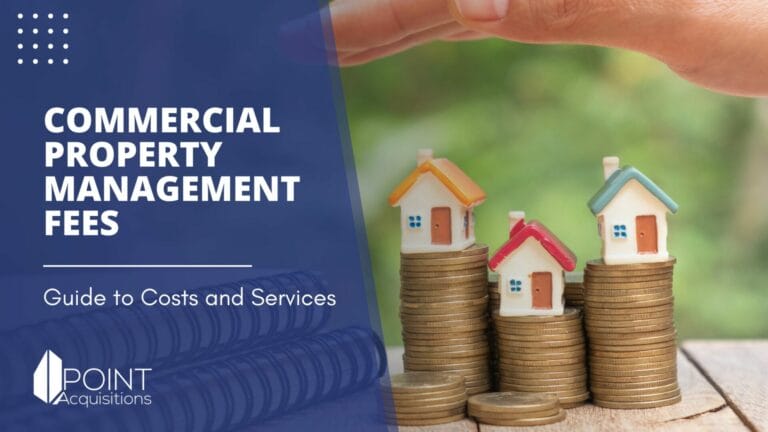
Understanding Commercial Property Management Fees: A Guide to Costs and Services
Imagine trimming up to 20% off your overheads just by mastering the ins and outs of commercial property management fees. That’s right—this often-overlooked aspect of real estate investing could be your secret weapon in optimizing returns.
Welcome to a no-nonsense guide that peels back the complexity surrounding these fees. Get ready to pass through the landscape of standard fee structures, like percentages and flat rates, and uncover hidden charges that might be nudging your expenses north.
Brace yourself for a deep dive into each facet of property management fees, armed with insights for smarter financial decision-making.

Table of Contents
Key Takeaways
- Commercial property management fees vary based on factors like location, property complexity, and provided services, with common structures including percentage-based fees, fixed fees, or a combination, and possible additional charges for leasing, renewals, eviction, and maintenance.
- A good property manager adds significant value by increasing rental income potential, managing day-to-day operations, easing rent collection, and managing financial reporting and budgeting.
- Selecting the right property management firm involves considering the company’s experience, reputation, service offerings, and detailed understanding of the contract’s terms and conditions to make sure they match the property’s needs and financial objectives.
Decoding the Structure of Commercial Property Management Fees
Commercial property management fees are not as cryptic as they might seem at first glance. They are typically structured as a percentage of rent, fixed fees, or a combination of both. These fees can vary based on a number of factors, such as:
- the property’s location
- complexity
- size
- the services provided by the property management firm
Additionally, there may be extra charges for specific services required by the property.
Grasping the fee structure is key for successful commercial real estate investment.
Percentage-Based Fee Explained
Percentage-based fees are probably the most common type of property management fee. They are calculated as a percentage of the monthly rent collected, typically falling within the range of 4-7%. However, for smaller properties, these fees can reach up to 10% or more.
The appeal of this fee structure is its simplicity and equitable nature. The property management company earns more when the property generates higher rental income, matching the interests of the management company with those of the investors.
Fixed Versus Variable Fees
Unlike percentage-based fees, a monthly management fee in the form of flat fee pricing is a set amount billed monthly, regardless of tenant count. This model offers predictability for property owners, but it’s important to be aware of potential hidden costs that might inflate the overall property management cost.
For instance, a property management company might charge a monthly fixed fee of $1,000. While this seems straightforward, there could be additional costs, such as a leasing fee of $300 for every new tenant or a renewal fee of $200 for every lease renewal. These extra charges can significantly increase the overall cost of property management.
Variable fees also exist, fluctuating based on aspects such as property size, location, and offered services. Although these fees fluctuate, they often provide a more personalized approach to property management pricing.
Assessing Additional Charges
Beyond the primary fee structure, commercial property owners might come across additional charges. These supplementary expenses can include:
- Leasing fee: charged for the service of finding and placing a suitable tenant in a vacant unit
- Lease renewal fee: cover the expenses needed to revise and manage a new lease
- Eviction fees: incurred when legal action is required to remove a tenant
- Maintenance fees: cover the cost of repairs and upkeep of the property
While these extra charges are distinct from the basic management fee, they are crucial to the total commercial property management cost.

The Value Proposition of Professional Property Managers
Commercial property owners greatly benefit from the expertise of professional property managers. They not only help to deal with the complex terrain of property management fees but also provide an array of services that increase the property’s rental income potential and minimize operational hassles.
From managing day-to-day tasks such as interacting with tenants, vendors, and contractors, to scaling operations for property owners who wish to expand their portfolios, property managers offer a host of benefits.
Increasing Rental Income Potential
A significant way property managers contribute is by increasing the rental income potential of commercial properties. The property manager’s role extends beyond just collecting rent. They use various strategies to maximize rental income, such as:
- screening potential tenants
- implementing property improvements
- obtaining suitable insurance coverage
For instance, property upgrades can justify higher rents, attract quality tenants, reduce maintenance requests, and differentiate properties in the market. Additionally, excellent customer service can build trust and brand loyalty, contributing to higher property values.
Minimizing Operational Hassles
Property management is a complex role that requires handling a multitude of operational tasks. From routine maintenance to dealing with tenant complaints, the daily challenges can be time-consuming and demanding. This is where professional property managers come in. They can take over these mundane tasks, allowing property owners to focus on strategic decisions rather than daily operations.
Through regular property maintenance, quick response to tenant issues, and setting clear rules, property managers can greatly minimize operational difficulties.
Tailoring Management Services to Commercial Real Estate Needs
Commercial property management is not a one-size-fits-all service. Different types of properties – from retail and office spaces to industrial buildings – have unique needs and challenges. Therefore, the property management services provided by property management companies need to be tailored to the specific needs of these diverse commercial properties.
This customization makes sure that each property is managed effectively and helps to balance the cost with the depth of services provided.
Specialized Services for Diverse Properties
Varied types of commercial properties require diverse specialized services. For instance, retail commercial properties may require expertise in various retail categories and comprehensive commercial property maintenance services.
On the other hand, industrial commercial properties require value-based solutions customized to long-term facility needs. By providing these specialized services, property management firms can make sure that each property is managed effectively and efficiently.
Balancing Cost with Service Depth
A significant factor for property owners is balancing cost with the extent of services. While it’s important to have extensive services, it’s equally important to make sure that these services are cost-effective. Property management firms can offer various fee structures to achieve this balance, such as fixed rate, percentage-based, or cost-plus models.
This allows property owners to choose a payment plan that matches their financial situation and guarantees they receive the appropriate level of service for their property.

Financial Management and Rent Collection Strategies
Successful commercial property management relies heavily on efficient financial management and rent collection strategies. Some key aspects of effective financial management in commercial property management include:
- Increasing property value
- Attracting tenants
- Maintaining physical assets
- Optimizing financial performance
These strategies play a key role in successful commercial property management.
Similarly, efficient rent collection processes can guarantee timely payments and minimize late fees.
Streamlining Rent Collection Processes
Rent collection is a fundamental part of property management. However, it can also be a time-consuming and complex process. Property managers can streamline this process by:
- automating rent collection
- establishing clear policies
- using property management software
These methods not only improve the efficiency of rent collection but also reduce the time required by property management staff.
This is another example of how property managers can add value to commercial properties.
Overseeing Financial Reporting and Budgeting
Beyond rent collection, property managers also oversee financial reporting and budgeting, which is an important part of their role. These tasks involve:
- tracking and reporting on income and expenses
- creating budgets
- analyzing financial performance
This helps property owners get a comprehensive overview of their property’s financial health, allowing them to make informed decisions.
Furthermore, budgeting helps in tenant screening, reducing vacancies, and achieving economies of scale.
Managing Lease Agreements and Tenant Relations
Two other vital elements of property management are lease agreements and tenant relations. Crafting and managing lease agreements is an important task that requires a deep understanding of legal aspects and local regulations.
This involves knowing the ins and outs of property law, understanding the nuances of local real estate regulations, and being able to craft agreements that protect the interests of the property owner while also being fair to tenants. It’s a delicate balancing act that requires a high level of expertise and precision.
Similarly, managing tenant relations involves clear communication, effective conflict resolution, and a commitment to tenant satisfaction.
Crafting and Managing Lease Terms
Crafting and managing lease terms is a complex task that requires a detailed understanding of the property, the market, and the legal landscape. Property managers are important in this process by:
- drafting clear and compliant leases
- handling negotiations
- resolving issues
- managing lease agreements by explaining terms to tenants
- enforcing move-out dates
- collecting rent
- coordinating repairs
- maintaining communication to handle tenant complaints and requests
Facilitating Lease Renewals and Negotiations
In addition to crafting and managing lease terms, property managers are also responsible for:
- Facilitating lease renewals and negotiations
- Offering incentives and alternatives to tenants
- Leveraging market conditions
- Regularly reviewing leases to optimize benefits and minimize costs
These strategies help negotiate favorable terms for property owners.

Innovations in Property Management: Adding Value and Cutting Costs
In the era of technological advancement and heightened environmental consciousness, innovations in property management are revolutionizing the industry. From technology-driven solutions to sustainable practices, these innovations are not only adding value but also cutting costs for commercial properties.
Technological Advancements in Property Management
The influence of technological advancements on property management is immense. Some of the key technologies that are reshaping the industry and improving efficiency include:
- Property management software
- Online rent payment systems
- Smart home technology
- Virtual property tours
- Automated maintenance requests
For instance, let’s look at the technology of online rent payment systems. This digital solution simplifies the payment process, allowing tenants to pay their rent anytime and anywhere. It eliminates the need for physical checks and manual record-keeping, thus reducing the administrative burden for property managers.
Moreover, it also provides a convenient and user-friendly experience for tenants, which can improve their satisfaction and potentially increase their likelihood of renewing their lease. This way, online rent payment systems not only make property management more efficient but also improve the tenant experience, thereby increasing property value.
Sustainable Practices for Cost Savings
Implementing sustainable practices, another innovative approach in property management can result in substantial cost savings. Some examples of sustainable practices include:
- Energy-efficient upgrades
- Waste reduction initiatives
- Water conservation measures
- Use of renewable energy sources
These practices not only reduce operating costs but also make properties more appealing to environmentally conscious tenants.
By implementing these practices, property owners can achieve operational cost savings of 14%-19% over time, making sustainability a worthwhile investment.

Selecting the Right Commercial Property Management Firm
Once they have grasped the nuances of property management fees, acknowledged the value brought by property managers, and understood industry innovations, commercial property owners can proceed to select an apt property management firm. This decision should be based on a variety of criteria, including:
- The firm’s experience
- Reputation
- Service offerings
- Contract terms
Criteria for Evaluating Management Companies
In the evaluation process, property owners should take into account the following factors when choosing a property management company:
- Expertise
- Reputation
- Communication skills
- Credentials
- Industry experience
The company’s reputation, for instance, is a strong indicator of its reliability and service quality. Moreover, the scope of services offered by the company should align with the property’s needs.
Understanding Contract Terms and Conditions
Understanding the terms and conditions of the contract is another significant part of choosing a property management firm. These contracts typically include details about:
- the business relationship between the parties
- lease agreements
- operating expenses
- financial and operational obligations
- fees and compensation
- termination clauses
Understanding these terms can help property owners avoid potential pitfalls and generate a fruitful partnership with the right property management firm.
Interactive Elements: Tools for Estimating Management Costs
In today’s digital era, numerous interactive tools are available to help property owners estimate management costs. These tools, such as online calculators and comparison websites, are immensely useful as they allow property owners to estimate costs, compare different management companies, and make informed decisions.
They provide a clear, convenient, and comprehensive overview of potential management costs, helping property owners better plan their budgets and select the most cost-effective and suitable service.
Summary
In conclusion, understanding commercial property management fees and the value proposition of property managers is crucial for successful commercial real estate investment. By leveraging technological advancements and sustainable practices, property owners can add value and cut costs.
Finally, choosing the right property management firm involves evaluating various criteria, understanding contract terms, and using interactive tools to estimate costs. With this knowledge, you are well-equipped to navigate the complex landscape of commercial property management.

Frequently Asked Questions
How much do commercial property managers charge in Florida?
California property managers typically charge a percentage of the monthly rental income, ranging from 4% to 12% of the gross collected rent. Some may also charge leasing or setup fees.
How much are property management fees in Texas?
Property management fees in Texas typically range between 8% and 15% of the monthly rent collected, with most companies charging around 10%. This can vary depending on the specific company and the services offered.
How is a management fee calculated in real estate?
Management fees in real estate are typically calculated as a percentage of the monthly rental income, with property managers charging between 4% and 12% of the property’s overall rent, though it can go as low as 3% or as high as 15% depending on the property size and specific situation.
How much do property managers charge in Pinellas County?
Property managers in Pinellas County typically charge 6% of the rent collected for full management, with a minimum of $150 per month and no fee during vacancy. For tenant procurement, they usually charge 4-6% of the total rent for the lease term.
What are the different types of commercial property management fees?
The different types of commercial property management fees include percentage of rent, fixed fees, or a combination of both, with potential additional charges for specific services. Consider these fee structures when evaluating property management options.
About The Author

Jesse Shemesh
Disclaimer
Please note that Point Acquisitions is not a tax expert or tax advisor. The information on our blogs and pages is for general informational purposes only and should not be relied upon as legal, tax, or accounting advice. Any information provided does not constitute professional advice or create an attorney-client or any other professional relationship. We recommend that you consult with your tax advisor or seek professional advice before making any decisions based on the information provided on our blogs and pages. Point Acquisitions is not responsible for any actions taken based on the information provided on our blogs and pages.
1031 Exchange Capital Gains Tax Deferral
According to a 2021 report by the National Real Estate Exchange Services (RES), over 240,000 1031 exchange transactions were completed in the United States, totaling $100 billion. This impressive figure underscores the role of 1031 exchanges in the real estate…
Read More1031 Exchange Benefits
As of Q4 2023, the national vacancy rate for all commercial property types in the United States sat at 9.2%, according to CBRE’s latest insights and research. This represents a slight decrease compared to the previous quarter and suggests a…
Read More1031 Exchange Legal Considerations: A Must-Read Guide
You’re in the right place if you’re considering a 1031 exchange for your commercial real estate investments. Whether you’re a seasoned investor or just dipping your toes into the market, understanding the legal landscape of 1031 exchanges is key to…
Read More

